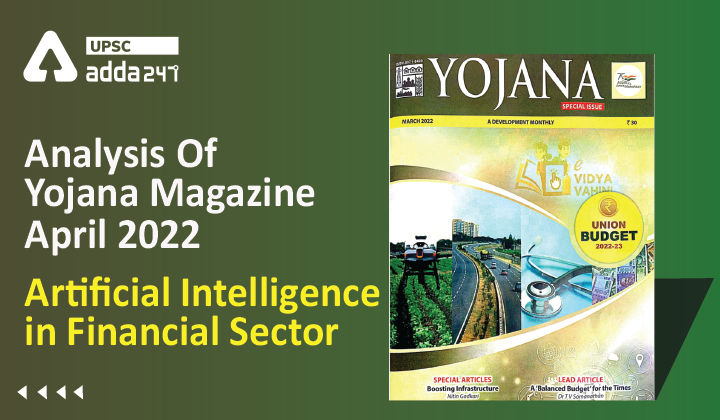Table of Contents
Analysis Of Yojana Magazine:
”Artificial Intelligence in Financial Sector”
Relevance
”GS 3: IT & Computers”
Introduction
- Artificial Intelligence is the future of Finance & banking as it brings the power of advanced data analytics to combat fraudulent transactions and improve compliance.
- AI algorithm accomplishes anti-money laundering activities in few seconds, which otherwise take hours and days.
- AI also enables banks to manage huge volumes of data at record speed to derive valuable insights from it.
What is Artificial Intelligence(AI)?
- Artificial intelligence (AI) systems are machine-based systems with varying levels of autonomy that can,
for a given set of human-defined objectives, make predictions, recommendations or decisions. - AI techniques are increasingly using massive amounts of alternative data sources and data analytics referred
to as ‘big data’. - Such data feed machine learning (ML) models which use such data to learn and improve predictability and performance automatically through experience and data, without being programmed to do so by humans.
AI & Finance Sector
- AI techniques can be applied in asset management and the buy-side activity of the market for asset allocation and stock selection.
- When used in trading, AI can add a layer of complexity to conventional algorithmic trading, as the algorithms learn from data inputs and dynamically evolve into computer-programmed algos, able to identify and execute trades without any human intervention.
- AI techniques could exacerbate illegal practices in trading aiming to manipulate the markets, and make it more difficult for supervisors to identify such practices if collusion among machines is in place.
- AI models in lending could reduce the cost of credit underwriting and facilitate the extension of credit to ‘thin file’ clients, potentially promoting financial inclusion.
- The use of AI techniques in blockchain-based finance could enhance the potential efficiency gains in DLT-based systems and augment the capabilities of smart contracts.
- In the future, AI could support decentralised applications in decentralised finance (‘DeFi’).
Indian Banking and AI
- Harnessing cognitive technology with Artificial Intelligence (AI) brings the advantage of digitization to banks and helps them meet the competition posed by FinTech players.
- In fact, about 32% of financial service providers in India are already using AI technologies like Predictive Analytics, Voice Recognition, among others, according to a joint research conducted by the National Business Research Institute and Narrative Science.
- Features such as AI bots, digital payment advisers and biometric fraud detection mechanisms lead to higher quality of services to a wider customer base. All this translates to increased revenue, reduced costs and boost in profits.
Potential Risks of AI in the Finance Sector
- AI applications in finance may create or intensify financial and non-financial risks, and give rise to potential
financial consumer and investor protection considerations. - The use of AI amplifies risks that could affect a financial institution’s safety and soundness, given the lack of explainability or interpretability of AI model processes, with potential for pro-cyclicality and systemic risk in the markets.
- The difficulty in understanding how the model generates results could create possible incompatibilities with existing financial supervision and internal governance frameworks, while it may even challenge the technology-neutral approach to policymaking.
- AI may present particular risks of consumer protection, such as risks of biased, unfair or discriminatory consumer results, or data management and usage concerns.
- While many of the potential risks associated with AI in finance are not unique to AI, the use of AI could amplify such vulnerabilities given the extent of complexity of the techniques employed, the dynamic adaptability of AI-based models and their level of autonomy for the most advanced AI applications.
Conclusion
Potential risks of AI should be continually assessed and managed to ensure that AI systems function in a robust and resilient way. In fact, AI in finance should be seen as a technology that augments human capabilities instead of replacing them.



 TSPSC Group 1 Question Paper 2024, Downl...
TSPSC Group 1 Question Paper 2024, Downl...
 TSPSC Group 1 Answer key 2024 Out, Downl...
TSPSC Group 1 Answer key 2024 Out, Downl...
 UPSC Prelims 2024 Question Paper, Downlo...
UPSC Prelims 2024 Question Paper, Downlo...





